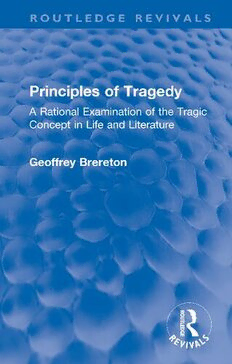
Principles of Tragedy: A Rational Examination of the Tragic Concept in Life and Literature PDF
Preview Principles of Tragedy: A Rational Examination of the Tragic Concept in Life and Literature
Routledge Revivals Principles of Tragedy What is tragedy? What does the term imply? The word had outgrown its original context of literature and art and acquired wider and looser meanings. Originally published in 1968, Dr Brereton seeks to establish the basis of a definition which will hold good on various planes and over a wide range of dramatic and other literature. Various theories are examined, beginning with Aristotle and taking in the Marxist interpretation and the two main religious theories of the sacrificial hero and the built-in conflict in fallen human nature. These theories are tested out on representative works by Sophocles, Shake- speare, Racine, Ibsen, Beckett and others, and the findings which emerge are developed in the course of the book. This is conceived as a re-exploration of a widely debated subject in the light of a few clear basic principles. The result is a lucid study which will be especially valuable for students of literature and drama. Principles of Tragedy A Rational Examination of the Tragic Concept in Life and Literature Geoffrey Brereton Firstpublishedin1968 byRoutledge&KeganPaulLtd Thiseditionfirstpublishedin2022byRoutledge 4ParkSquare,MiltonPark,Abingdon,Oxon,OX144RN andbyRoutledge 605ThirdAvenue,NewYork,NY10017 RoutledgeisanimprintoftheTaylor&FrancisGroup,aninformabusiness ©1968GeoffreyBrereton All rightsreserved.No part ofthis bookmaybe reprintedor reproducedor utilisedin any form or by any electronic, mechanical, or other means, now known or hereafter invented, including photocopying and recording, or in any information storage or retrievalsystem,withoutpermissioninwritingfromthepublishers. Publisher’sNote Thepublisherhasgonetogreatlengthstoensurethequalityofthisreprintbutpoints outthatsomeimperfectionsintheoriginalcopiesmaybeapparent. Disclaimer The publisher has made every effort to trace copyright holders and welcomes correspondencefromthosetheyhavebeenunabletocontact. ALibraryofCongressrecordexistsunderISBN:0710061684 ISBN:978-1-032-25303-9(hbk) ISBN:978-1-003-28262-4(ebk) ISBN:978-1-032-25310-7(pbk) BookDOI10.4324/9781003282624 Principles of Tragedy A Rational Examination of the Tragic Concept in Life and Literature by GEOFFREY BRERETON ROUTLEDGE & KEGAN PAUL London First Published 1968 by Routledge & Kegan Paul Ltd Broadway House, 68-74 Carter Lane London, E.G.4 Printed in Great Britain by Butler & Tanner Ltd Frome and London © Geoffrey Brereton 1968 No part of this book may be reproduced in any form without permission from the publisher, except for the quotation of brief passages in criticism SBN 7100-6168 4 Contents Foreword page vii I. TRAGEDY IN THEORY 1. The Notion of Tragedy 3 2. The Legacy of Aristotle 21 3. Tragedy and Religion 48 4. The Tragic Sense of Life 56 II. TRAGEDY IN PRACTICE 5. Some Classic Tragedies: Oedipus, Hamlet, Macbeth, Phedre 77 6. Some Constants of Dramatic Tragedy 107 7. An Anti-Tragedy: Candide 127 III. THE DUALITY CONFLICT 8. Two Worlds or One? Neoplatonism, Pascal 139 9. Imagination Enthroned: Blake and Romanticism 172 10. Imagination Dethroned: Ibsen, Chekhov 189 IV. TWENTIETH-CENTURY POSITIONS 11. Claudd: Partage de Midi 225 12. Beckett: Waiting for Godot 244 13. Consequences 266 Index 281 V Foreword This book originated in a search for a definition either of tragedy or of the main tragic elements which would hold good on various planes and over a wide range of literature and drama. It seemed that if the term 'tragic' had any validity at all when used by a modern com- mentator it ought to include factors common at least to Sophocles, Shakespeare, Racine, and probably Ibsen and others, irrespective of the difference in their historical and ethical backgrounds. The simple conviction that this should be so runs into truly formidable objec- tions, but the author eventually reached the conclusion that they are not insurmountable providing one confines oneself to essentials. The first results of an inquiry of this kind are a number of nega- tions. It quickly became apparent that the concept of tragedy has been over-extended by some commentators to include elements which do not belong to it necessarily or exclusively. If empirical and local, they fail when transposed to a different context. If 'universal', they can embrace too much and the concept becomes nebulous. An out- standing example, which can be attached to either category according to the angle of approach, is the nineteenth-century persuasion of the existence of a 'tragic' duality in human nature. Other interpretations appear on examination to be equally wide of the mark, not on the grounds of their general validity as explanations of the human con- dition, which the present writer claims no competence to assess, but on the narrower issue of their relevance to tragedy. The wider issues cannot of course be ignored. Any general investi- gation of the nature of tragedy inevitably broaches questions belong- ing to theology or philosophy, or even (particularly when considering the function of tragedy) to sociology and psychology. Indeed the potential field of exploration is so wide that no one specialist could hope to cover it, while a symposium of specialists—if past experience is any guide—would fail to arrive at any agreed conclusions at all. It therefore seemed necessary, given the primary objective of pro- gressing at least some way towards a clear definition, to conduct this inquiry along deliberately restricted lines. This involved, among other vii
